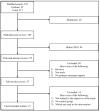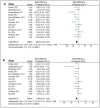The Effect of Walnut Intake on Lipids: A Systematic Review and Meta-Analysis of Randomized Controlled Trials
- PMID: 36364723
- PMCID: PMC9655834
- DOI: 10.3390/nu14214460
The Effect of Walnut Intake on Lipids: A Systematic Review and Meta-Analysis of Randomized Controlled Trials
Abstract
Cardiovascular diseases (CVD) are the leading causes of death worldwide. Dyslipidemia is a cardiometabolic risk factor of CVD, yet it can be modifiable. Walnuts have been suggested as a dietary intervention to improve the lipid profile. Therefore, we reviewed the literature to assess the evidence linking walnut intake to the improvement of blood lipids, including total cholesterol (TC), low-density lipoprotein (LDL-C) cholesterol, high-density lipoprotein (HDL-C) cholesterol, and triglycerides (TG). PubMed and Embase databases were searched from 2010 up to March 2022. We limited our search to randomized controlled trials conducted on humans and published in English during the specified period. Cochrane's risk of bias tool for interventional studies was used. A random-effects model was used for the meta-analysis, and weighted mean differences were obtained (WMD) Thirteen trials from the U.S., Europe, and Asia were included. Walnut intake was associated with significant reductions in TC (WMD: -8.58 mg/dL), LDL-C (WMD: -5.68 mg/dL), and TG (WMD: -10.94 mg/dL). Walnut consumption was not associated with HDL-C. Subgroup analysis showed that overweight/obese and those with comorbidities had more lipid improvement. A longer trial duration did result in further improvements. However, our results may be prone to bias due to extraneous confounding factors. Additionally, levels of heterogeneity were considerable for some outcomes of interest. Results from this meta-analysis provide evidence for the health benefits of walnuts on blood lipids. Walnuts possibly reduce the risk of CVD; thus, they can be successfully added to a dietary pattern to enhance health benefits.
Keywords: dyslipidemia; low density lipoprotein cholesterol (LDL-C); meta-analysis; randomized controlled trials; total cholesterol (TC); triglyceride (TG); walnuts.
Conflict of interest statement
The authors declare no conflict of interest.
Figures




References
-
- Ponce O.J., Larrea-Mantilla L., Hemmingsen B., Serrano V., Rodriguez-Gutierrez R., Spencer-Bonilla G., Alvarez-Villalobos N., Benkhadra K., Haddad A., Gionfriddo M.R. Lipid-lowering agents in older individuals: A systematic review and meta-analysis of randomized clinical trials. J. Clin. Endocrinol. Metab. 2019;104:1585–1594. doi: 10.1210/jc.2019-00195. - DOI - PubMed
Publication types
MeSH terms
Substances
LinkOut - more resources
Full Text Sources
Miscellaneous

